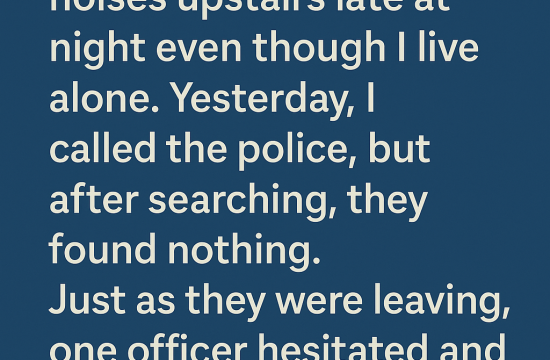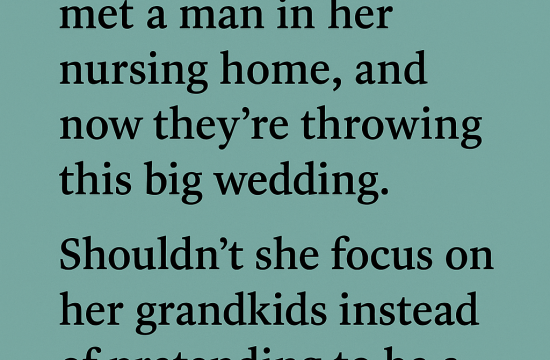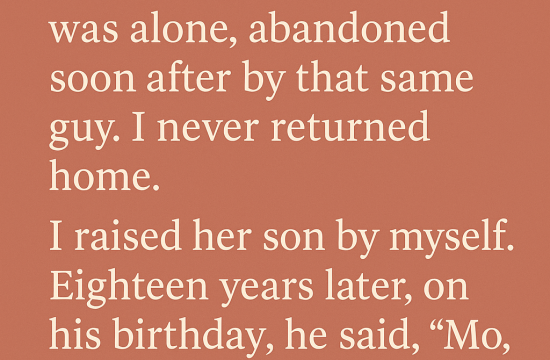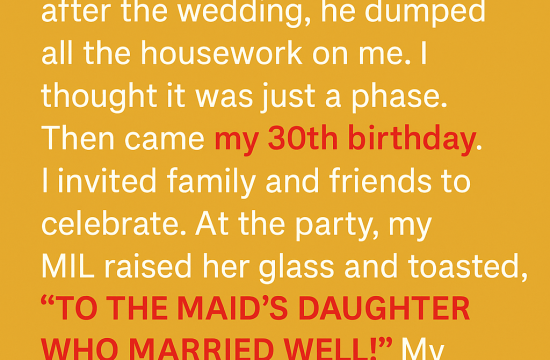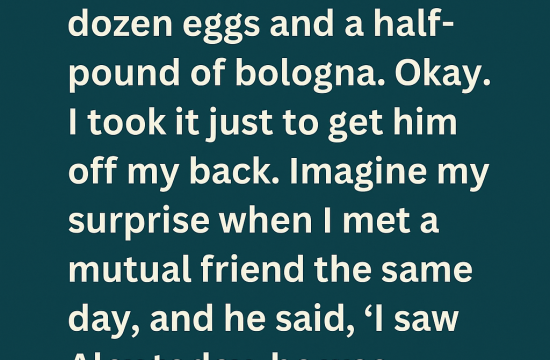My kids and grandkids hadn’t visited me for months. Always the same excuse—“We’re just so busy, Mom.” I tried to understand. Life moves fast. But the silence of my apartment was beginning to feel heavier with each passing day.
Last weekend, I decided to stop waiting. I packed some cookies and a container of stew and drove to their home unannounced.
My son opened the door, surprised. But nothing could have prepared me for what I saw behind him.
My daughter-in-law stood there, barely recognizable. Pale, fragile, with hollow eyes and a forced smile. Her clothes looked too big, her frame swallowed by something deeper than illness.
“Hi, Mom,” she whispered.
I stepped into their house, instantly noticing the eerie quiet. No cartoons. No laughter. No kids. Just an unsettling stillness.
“Where are the kids?” I asked gently.
“At a friend’s. For the weekend,” my son mumbled, not meeting my eyes.
All three of them? At once? That had never happened before.
We moved to the living room. My daughter-in-law excused herself to lie down. I didn’t stop her. She looked like she was carrying the weight of the world.
I turned to my son. “Tell me the truth. What’s going on?”
He sighed deeply, rubbing his face. “She’s sick, Mom. The doctors think it’s an autoimmune disorder. Still running tests. Some days she can’t even stand.”
My throat tightened. “Why didn’t you call me?”
He looked ashamed. “We thought it would pass. And I didn’t want to worry you.”
I reached across and took his hand. “You don’t have to protect me. I’m your mother. Let me help.”
His eyes brimmed with tears. “I’m exhausted, Mom. Between work, the kids, and her—I’m drowning.”
That weekend, I stayed. I cooked, did the laundry, cleaned, sorted bills. I sat with my daughter-in-law when she couldn’t speak and listened when she could.
On Sunday evening, just before I left, she reached for my hand.
“Thank you,” she said, voice fragile but sincere. “I didn’t know how much I needed someone until you showed up.”
I hugged her gently. “You’re not alone. Not anymore.”
Back in my apartment, the silence greeted me again. But this time, it felt emptier than ever. I sat down and wrote a letter—not to scold or guilt—but to remind my kids how short life is, how much I missed them, and how I feared we were drifting apart.
But I never sent it.
The next morning, my phone rang.
It was Clara, my youngest granddaughter. “Grandma, can we come over this weekend? We miss you.”
Something had shifted.
That Saturday, they all came. My son, my daughter-in-law—still weak, but smiling—and the kids, who filled my home with laughter again. We made pancakes, watched cartoons, played card games. My apartment, once quiet and still, pulsed with life.
Later, my son pulled me aside. “Clara said you seemed lonely when she called. I guess we didn’t realize how long it’s been.”
Tears filled my eyes. “We all get caught up. But no one should ever feel forgotten.”
After that visit, something beautiful happened. The calls came more often. The visits became routine. My daughter-in-law began responding to treatment. Her cheeks regained color. Her laugh returned.
My son smiled more.
And I? I started living again.
I joined a walking group. Baked more. Laughed more. I wasn’t waiting by the phone—I was part of something again.
One day at the park, while watching the kids play, I met another grandmother on a nearby bench. Her name was Teresa. She hadn’t seen her grandkids in over a year.
“They’re busy,” she said, with a faint smile. “They have lives.”
I recognized that ache. “Sometimes, we have to remind them we’re still here,” I said. “I visited mine even when I wasn’t sure I’d be welcome. Best decision I ever made.”
A few days later, Teresa called me.
“I surprised my daughter. She cried when she saw me,” she said, laughing through tears. “She said she was just thinking about calling.”
Funny how life works.
That summer, we had a family barbecue at my place. Everyone helped. My son grilled. My daughter-in-law brought her famous pasta salad. Clara bossed her brothers around like a miniature general.
My son raised a toast.
“To Mom,” he said, holding up a plastic cup. “For showing up when we didn’t even know we needed her.”
Later, as I washed dishes with my daughter-in-law, she said something that stayed with me.
“I used to think being strong meant doing everything alone. But it’s actually about letting people in.”
I nodded. “I used to think the same.”
A few days later, I received a letter in the mail. From Ben, my 14-year-old grandson. He thanked me for “always being there” and said he wanted to visit more, even without his parents.
I sat quietly, the letter in my lap, heart full.
So much we don’t say. So many feelings we carry around, waiting for the right time.
But love doesn’t need timing. It needs presence.
My daughter-in-law eventually made a full recovery. She picked up painting, even started working part-time again. One of her first pieces was a soft watercolor of three generations of our family, standing outside a little house with sunflowers.
It hangs in my hallway now.
That fall, my walking group started volunteering at a shelter. I invited Teresa, and she came—grandkids and all. They even cooked a holiday meal there together.
Sometimes, all it takes is one brave act. One knock on a door. One unsent letter. One whispered “I’ve missed you.”
Looking back, I didn’t just visit my family that weekend.
I reminded them—and myself—that even in our busiest, darkest, loneliest moments…
Love still lives in the act of showing up.
And sometimes, that’s where the healing begins.




